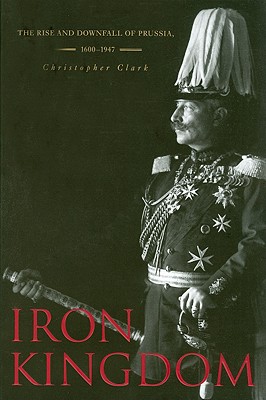

 Belknap Press
Belknap Press
Iron Kingdom: The Rise and Downfall of Prussia, 1600-1947


Key Metrics
- Christopher Clark
- Belknap Press
- Paperback
- 9780674031968
- 9.24 X 6.28 X 1.68 inches
- 2.41 pounds
- History > Europe - Germany
- English
 Secure Transaction
Secure TransactionBook Description
In the aftermath of World War II, Prussia--a centuries-old state pivotal to Europe's development--ceased to exist. In their eagerness to erase all traces of the Third Reich from the earth, the Allies believed that Prussia, the very embodiment of German militarism, had to be abolished.
But as Christopher Clark reveals in this pioneering history, Prussia's legacy is far more complex. Though now a fading memory in Europe's heartland, the true story of Prussia offers a remarkable glimpse into the dynamic rise of modern Europe.
What we find is a kingdom that existed nearly half a millennium ago as a patchwork of territorial fragments, with neither significant resources nor a coherent culture. With its capital in Berlin, Prussia grew from being a small, poor, disregarded medieval state into one of the most vigorous and powerful nations in Europe. Iron Kingdom traces Prussia's involvement in the continent's foundational religious and political conflagrations: from the devastations of the Thirty Years War through centuries of political machinations to the dissolution of the Holy Roman Empire, from the enlightenment of Frederick the Great to the destructive conquests of Napoleon, and from the iron and blood policies of Bismarck to the creation of the German Empire in 1871, and all that implied for the tumultuous twentieth century.
By 1947, Prussia was deemed an intolerable threat to the safety of Europe; what is often forgotten, Clark argues, is that it had also been an exemplar of the European humanistic tradition, boasting a formidable government administration, an incorruptible civil service, and religious tolerance. Clark demonstrates how a state deemed the bane of twentieth-century Europe has played an incalculable role in Western civilization's fortunes. Iron Kingdom is a definitive, gripping account of Prussia's fascinating, influential, and critical role in modern times.
Author Bio
Christopher Clark was educated at Sydney Grammar School from 1972 to 1978, the University of Sydney (where he studied history) and the Freie Universität Berlin from 1985 to 1987.
Clark received his PhD at the University of Cambridge, having been a member of Pembroke College from 1987 to 1991. He is Professor in Modern European History at the University of Cambridge and, since 1991, has been a fellow of St Catharine's College,[3] where he is currently Director of Studies in History. In 2003, Clark was appointed University Lecturer in Modern European History and, in 2006, Reader in Modern European History. His Cambridge University professorship in history followed in 2008.[4] In September 2014 he succeeded Richard J. Evans as Regius Professor of History at Cambridge. In the birthday honours of June 2015, Clark was knighted on the recommendation of the foreign secretary for his services to Anglo-German relations.[2]
Clark's research interests are centred on the history of nineteenth-century Germany and continental Europe. His early work focused on the political and cultural history of religion. His first book was a study of the relationship between Christians and the Jewish minority in Prussia between 1728 and 1941; here he explored the ways in which contemporary understandings of Christianity shaped successive mutations of the 'Jewish Question'.
Since then he has published various articles and essays on related subjects - some of them examine the trouble that results when the state authority takes the initiative in religious questions, others look at the ways in which questions of religious allegiance were implicated in processes of political and cultural change. In 2004 he co-edited, with Wolfram Kaiser of the University of Portsmouth, an edited volume about the 'culture war' between Catholic and secular social forces that polarized so many European states in the years 1850-1890.
In the meanwhile, he has published a study of Kaiser Wilhelm II (2000) for the Longmans/Pearson series Profiles in Power and completed a general history of Prussia for Penguin, due out in spring 2006.
He is currently working on a study of political change across Europe in the aftermath of the 1848 revolutions.
Source: University of Cambridge Faculty of History and U.K. government documents
Videos








Community reviews
Write a ReviewNo Community reviews